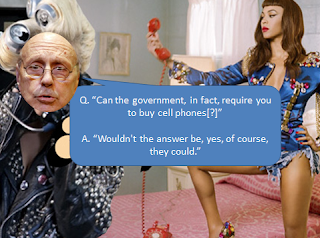 On the final day of Supreme Court oral arguments regarding Obamacare, Chief Justice Roberts interrupted Solicitor General Donald Verrilli, the poor man drafted to defend the indefensible, to note, “You have another 15 minutes.” At which point Verrilli glumly remarked, “Lucky me.”
On the final day of Supreme Court oral arguments regarding Obamacare, Chief Justice Roberts interrupted Solicitor General Donald Verrilli, the poor man drafted to defend the indefensible, to note, “You have another 15 minutes.” At which point Verrilli glumly remarked, “Lucky me.”Ah, cheer up. No one ever made him out to be some tall and suave model gentleman-and-scholar, some fountain of manliness with a charmingly paradoxical soft side, some Lucretius J.D., some glowing trumpet of reason who cuts community ratings in half simply by passing through a country-side village in an electric car, some epitomic conjunction of man and art.
 Well, not entirely anyway. NPR did tweet last Friday that Verrilli was a “gentleman and a scholar,” and went on to profile basic traits relevant to his role in articulating the constitutionality of the federal government’s unprecedented attempt to force Americans to buy stuff, such as how he “stands tall and calm in the Supreme Court chamber, his salt and pepper mustache the only thing about him that bristles.” And how “his deep, baritone voice suggests to the justices that he is the essence of reasonableness.” And how he is “a genuinely beloved figure, the kind of professional younger lawyers seek to emulate.” The profile ended with one final pragmatic, bare essentials question still on the minds of all civic-minded NPR listeners: “What makes him cry?”
Well, not entirely anyway. NPR did tweet last Friday that Verrilli was a “gentleman and a scholar,” and went on to profile basic traits relevant to his role in articulating the constitutionality of the federal government’s unprecedented attempt to force Americans to buy stuff, such as how he “stands tall and calm in the Supreme Court chamber, his salt and pepper mustache the only thing about him that bristles.” And how “his deep, baritone voice suggests to the justices that he is the essence of reasonableness.” And how he is “a genuinely beloved figure, the kind of professional younger lawyers seek to emulate.” The profile ended with one final pragmatic, bare essentials question still on the minds of all civic-minded NPR listeners: “What makes him cry?”  Nevertheless, if there was any hope-and-changiness to go around in the case's run-up, perhaps it was less about the under-sold Verrilli and more about the general excitement of at last validating the brave new Mrs. Fix-it paradigm of the 21st century. The atmosphere on the opening day was “electric,” said Jeffrey Toobin, CNN's Obamacare-advocating legal analyst.
Nevertheless, if there was any hope-and-changiness to go around in the case's run-up, perhaps it was less about the under-sold Verrilli and more about the general excitement of at last validating the brave new Mrs. Fix-it paradigm of the 21st century. The atmosphere on the opening day was “electric,” said Jeffrey Toobin, CNN's Obamacare-advocating legal analyst.But if optimism is a disease, consider the left-wing media cured. And consider Verrilli quarantined. Whereas NPR boasted on Friday of Verrilli that “only the occasional, needless throat-clearing betrays any nerves at all,” Mother Jones columnist Adam Serwer had concluded by Wednesday that Verrilli’s throat-clearing had jeopardized the entire Obamacare project: “He coughed, he cleared his throat, he took a drink of water. And that was before he even finished the first part of his argument.” Or in other words: Verrilli, you're such a pre-existing condition.
 By the time the decision is released in June, NPR will likely have revised the history of Verrilli’s “flameout” (as Serwer called it) to match the narrative of an earnest man with none of the qualities of a lawyer cut down by the bigotry and ignorance of the Supreme Court. But for now, the oral arguments provide an unedited and fascinating glimpse into the mind of the Supreme Court on perhaps the most important question facing the United States today: what are the constitutional limits on federal power?
By the time the decision is released in June, NPR will likely have revised the history of Verrilli’s “flameout” (as Serwer called it) to match the narrative of an earnest man with none of the qualities of a lawyer cut down by the bigotry and ignorance of the Supreme Court. But for now, the oral arguments provide an unedited and fascinating glimpse into the mind of the Supreme Court on perhaps the most important question facing the United States today: what are the constitutional limits on federal power? Most revealing were the questions and monologues (as caricatured in the accompanying pics) of the liberal Justices. From Justice Kagan’s “It’s just a boatload of federal money for you to take and spend on poor people’s healthcare,” to Justice Sotomayor’s jab at the excess of the “one percent,” to Justice Ginsburg’s frank “this penalty is designed to affect conduct,” to Justice Breyer’s answer to his own question of whether the government can require the purchase of cell phones: “Wouldn’t the answer be, yes, of course, they could.” But Verrilli himself revealed the most when he triumphantly declared that Obamacare is so expensive that of course the mandate is OK…indeed, actuarially necessary. Read the transcripts and weep. And weep too for Verrilli, who, by virtue of his optimism disease, will raise your community rating by approximately 4.2% if he ever escapes his quarantine.

